Possible Duplicate:
Conditional Linq Queries
Using Entity Framework 4.0
I have a search condition like this

There are four fields that allow the users to filter their search. The conditions are all AND. The result has to omit the corresponding filter if the textbox value is String.Empty or the dropdownlist value is All. Could do this in a Stored Procedure but I am unable to mimic that at all in a Linq2SQL/ Entity Framework scenario.
My question is this, how to omit IEnumerable.Where in the Linq according to some entered values?
